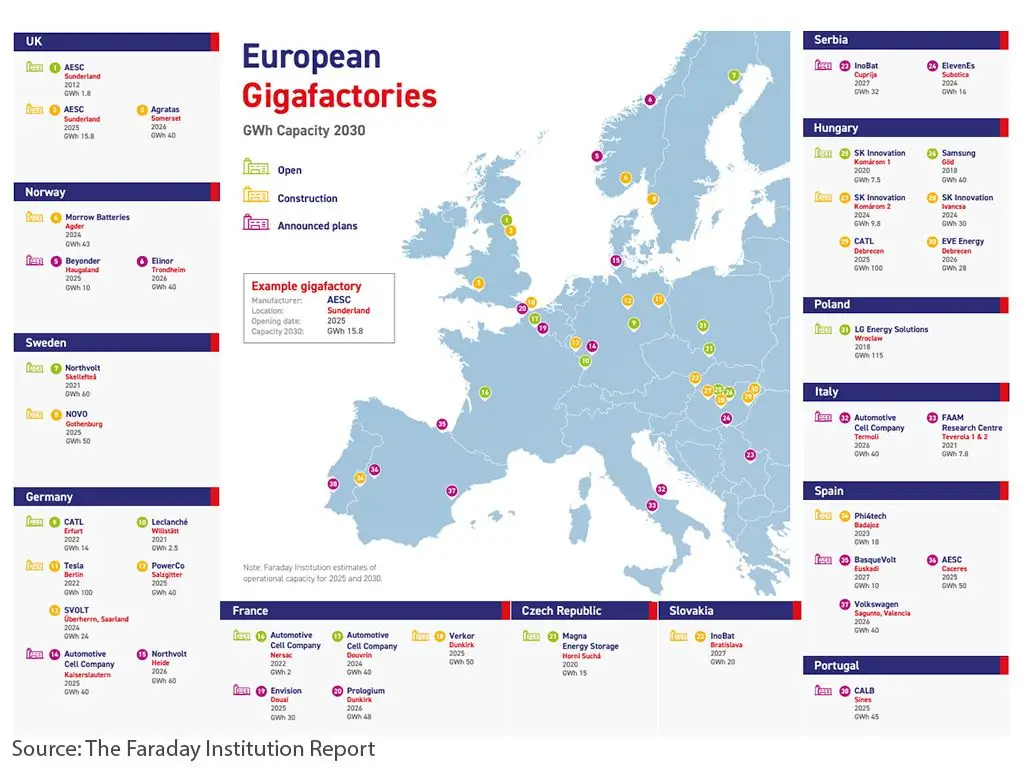The Faraday Institution has published an update to its 2022 study, predicting significant growth in the UK’s electric vehicle (EV) and battery production needs up to 2040. The report indicates that by 2030, the UK will require the equivalent of six gigafactories—large-scale battery manufacturing facilities—each producing 20 GWh of batteries annually. By 2040, this demand is expected to rise to the equivalent of ten such gigafactories.
Recent announcements by companies like AESC and Tata Group have highlighted the UK’s potential as an attractive location for battery manufacturing. The report suggests that the EV and battery industry could support up to 270,000 UK jobs by 2040. Despite these positive developments, the UK is currently behind its European competitors. Battery manufacturing plants announced or under construction in the UK are projected to reach a combined capacity of 57.6 GWh by 2030, accounting for about 4% of total European capacity, compared to Germany’s 21%.
The report emphasizes that more action is needed to meet future demand. Currently, 47% of the projected UK battery demand by 2030 remains unaddressed by existing gigafactory plans, and 71% of the demand projected for 2040 has yet to be met.
Access Report: UK Electric Vehicle and Battery Production Potential to 2040 (PDF)
Government and Battery Industry Insights
Sarah Jones, Minister for Industry and Decarbonisation, commented: “The UK has a thriving auto industry that employs over 150,000 people. Our modern Industrial Strategy will build on this legacy and bring growth, jobs, and opportunities to every part of the UK. We continue to work with investors and industry through our Automotive Transformation Fund to progress plans to build a globally competitive electric vehicle supply chain here in the UK, including work on unlocking crucial investment in gigafactories.”
Stephen Gifford, Chief Economist at the Faraday Institution, stated: “There is a growing sense of optimism that a highly productive and sustainable battery manufacturing industry can be built in the UK. By 2040, a successful industry could employ 170,000 people in EV manufacturing, 35,000 in gigafactories, and 65,000 in the battery supply chain.”
Professor Martin Freer, CEO of the Faraday Institution, added: “Next-generation batteries—such as solid-state, lithium-sulfur, and sodium-ion technologies—offer the UK an opportunity to take a market-leading position globally in applications beyond automotive. By building on current advantages—cutting-edge research and world-leading companies—the UK could establish a large-scale domestic manufacturing capability. But the UK must move quickly to exploit its competitive advantage.”
Matt Howard, Chief Strategy Officer at the Faraday Institution, expressed: “The move to electrify transport and toward large-scale battery production represents a massive shift in industrial skills. The UK’s engineering and manufacturing workforce can gain a competitive edge over other countries through the provision of a national training curriculum that will ensure the right skills are delivered at the right place and the right time.”
Path Forward For Strengthen The Battery Industry
The report outlines several key areas where concerted efforts are needed:
- Attracting Investment: Establish new gigafactories and expand existing ones to enhance battery manufacturing capabilities.
- Strengthening Component Manufacturing: Produce vital battery components domestically to comply with trade agreements and improve supply chain efficiency.
- Investing in Material Processing: Develop UK-based facilities for refining key battery materials like lithium and nickel to enhance self-sufficiency.
- Enhancing Supply Chain Resilience: Secure critical raw materials through international agreements and establish a competitive battery recycling industry.
- Accelerating Domestic Extraction: Explore and commercially extract key battery materials within the UK, focusing on lithium and graphite.
- Commitment to Research: Invest in long-term research for batteries that are more efficient, safer, and fully recyclable.
- Investing in Next-Generation Technologies: Intensify research into solid-state, sodium-ion, and lithium-sulfur batteries.
- Strengthening Commercialization Initiatives: Enhance strategic partnerships to accelerate market readiness for innovative battery technologies.
Source: UK Electric Vehicle and Battery Production Potential to 2040 (PDF), The Faraday Institution – News
















